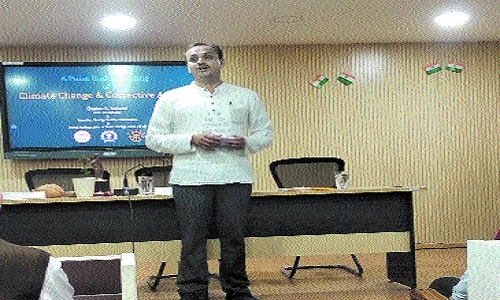‘Solar Man of India’ urges immediate individual action to combat climate change
17 Feb 2024 11:44:07

By Kriti Shah
In a compelling workshop on ‘Energy and Climate Correction’ hosted by Bhoj University on Friday, the ‘Solar Man of India’, Professor Chetan Singh Solanki delivered a stark message- climate is not changing; it has changed. Professor Solanki is on ‘Energy Swaraj Yatra’, in a solar-powered bus, igniting conversations on the imperative of sustainable energy practices and propagating the idea of individual action towards combating climate change across India for a span of 11 years, his journey started in 2020. He emphasised the urgent need for individual responsibility in addressing the critical issue of climate change. During the workshop, Professor Solanki outlined six key points, reshaping the narrative around climate change. Firstly, he asserted that climate change is not a future threat; it is a present reality. Second, carbon emerged as the primary culprit behind climate change, highlighting the critical role of carbon emissions in driving environmental shifts.
The speaker challenged the common notion that governments or nations alone are responsible for climate change. Instead, he emphasised a paradigm shift, declaring, “Not ‘We’, but ‘I am’ responsible for climate change.” The professor urged each individual to recognise their personal role in the larger context of global environmental challenges. He remarked, “Environmental degradation and climate change is everyone’s problem, contributed by everyone, and affecting everyone, therefore everyone needs to be part of the solution.” A significant portion of the workshop focused on the alarming carbon footprint associated with energy consumption, particularly in India. Professor Solanki revealed that a staggering 85% of total energy in the country is derived from sources releasing carbon dioxide, which is also imported. The carbon is not only emitted through vehicles or industries but also from the use of fuels used to prepare one time meal at home by an individual. Moreover, he underscored the prolonged impact of this carbon, taking an average of 300 years to be absorbed by the atmosphere.
Highlighting the urgency of the situation, the professor Solanki pointed out that Earth’s temperature has already risen by 1.25 degrees Celsius. He warned that without immediate action, this increase could reach 1.5 degrees to 2 degrees Celsius, marking an irreversible tipping point, calling it as ‘Lakshman Rekha’. The analogy of Earth having a fever and no ‘Paracetamol’ to save it resonated strongly, portraying the gravity of the situation. Throughout his address, he provided sobering statistics, including a staggering 52% increase in carbon emissions since the pre-industrial era. Mentioning ‘carbon budget’ (how much carbon can be released in the atmosphere), he added that the irreversible change will happen in approx next 5 years. One of the key solutions presented by the professor was the ‘AMG’ approach: Avoid, Minimise, Generate. He stressed the importance of avoiding unnecessary energy consumption, minimising usage when possible, and generating energy responsibly. He also emphasised on his existence rule, which is ‘limit your consumption’, ‘localise your production’, this is the soul of climate change which should be considered by every individual.
